Overview
Diabetics can enjoy certain types of alcohol, such as dry wines, light beers, spirits with zero-calorie mixers, and low-carb cocktails, while managing their carbohydrate intake to avoid spikes in blood sugar levels. The article supports this by detailing the carbohydrate content and health benefits of these options, as well as emphasizing the importance of moderation, meal timing, and hydration to mitigate risks associated with alcohol consumption for individuals with diabetes.
Introduction
Navigating the world of alcohol consumption can be particularly challenging for individuals managing diabetes. With the potential for blood sugar fluctuations and the risk of hypoglycemia, choosing the right beverages and understanding their effects is critical.
This article explores various alcohol options that are more suitable for diabetics, highlighting the importance of moderation and strategic planning. Additionally, it delves into the risks associated with alcohol consumption, offering practical tips for safely enjoying drinks while maintaining optimal health.
By equipping readers with essential knowledge, this guide aims to empower those with diabetes to make informed decisions about their alcohol intake.
Top Alcohol Choices for Diabetics
-
Dry Wines: Both red and white dry wines are great options for alcohol diabetics can have while managing their diabetes. With considerably lower carbohydrate content compared to sweet wines, dry wines are not only enjoyable but may also provide health advantages, especially due to the antioxidants found in red wine. A standard serving size is approximately 5 ounces, making it easy to incorporate into a balanced diet.
-
Choosing light beers is a practical strategy for diabetics, as these generally contain fewer carbohydrates than regular beers, making them a type of alcohol diabetics can have. Seek choices that offer approximately 5 grams of carbohydrates per serving, enabling moderate intake without significantly affecting blood glucose levels. Spirits with zero-calorie mixers, such as vodka, gin, tequila, and whiskey, represent types of alcohol diabetics can have in moderation, especially when mixed with zero-calorie alternatives like soda water or diet tonic. This pairing aids in managing control over glucose levels while still enjoying a variety of beverages. Champagne or sparkling wine are examples of alcohol diabetics can have, as these options tend to be lower in carbohydrates and can be enjoyed in moderation. Choosing brut varieties guarantees the best option regarding carbohydrate content, making them suitable for a diabetic-friendly celebration where alcohol diabetics can have. A homemade sangria crafted with dry red wine and fresh fruits—without added sugars—can be a refreshing option of alcohol diabetics can have. It is advisable to limit the quantity of fruit used to maintain control over sweetener intake, ensuring a delightful yet safe beverage.
Low-Carb Cocktails: Numerous bars now offer low-carb cocktails, which are types of alcohol diabetics can have, that incorporate sweetener substitutes or fresh ingredients. It is essential to inquire about the specifics of these drinks to confirm they align with individual dietary needs, allowing for enjoyment without compromising health.
- Hard seltzers: Frequently marketed as low-carb options, hard seltzers can be a refreshing choice for those looking for lighter alcoholic beverages, which are alcohol diabetics can have. Always check the labels to verify that they contain minimal sugars, ensuring they fit within the dietary guidelines for managing diabetes. It is important to note that cream liqueurs provide around 13 grams of carbs for every 2 oz (60 mL), which can significantly affect glucose levels. Specialists recommend that the danger of hypoglycemia is a reason for individuals with insulin issues to refrain from beverages if their glucose levels are already low. Furthermore, understanding the nuances in beverage consumption is crucial; a meta-analysis on misclassification in diabetes and beverage consumption studies highlights that misclassification could lead to an underestimation of the true causal association, emphasizing the need for careful consumption.
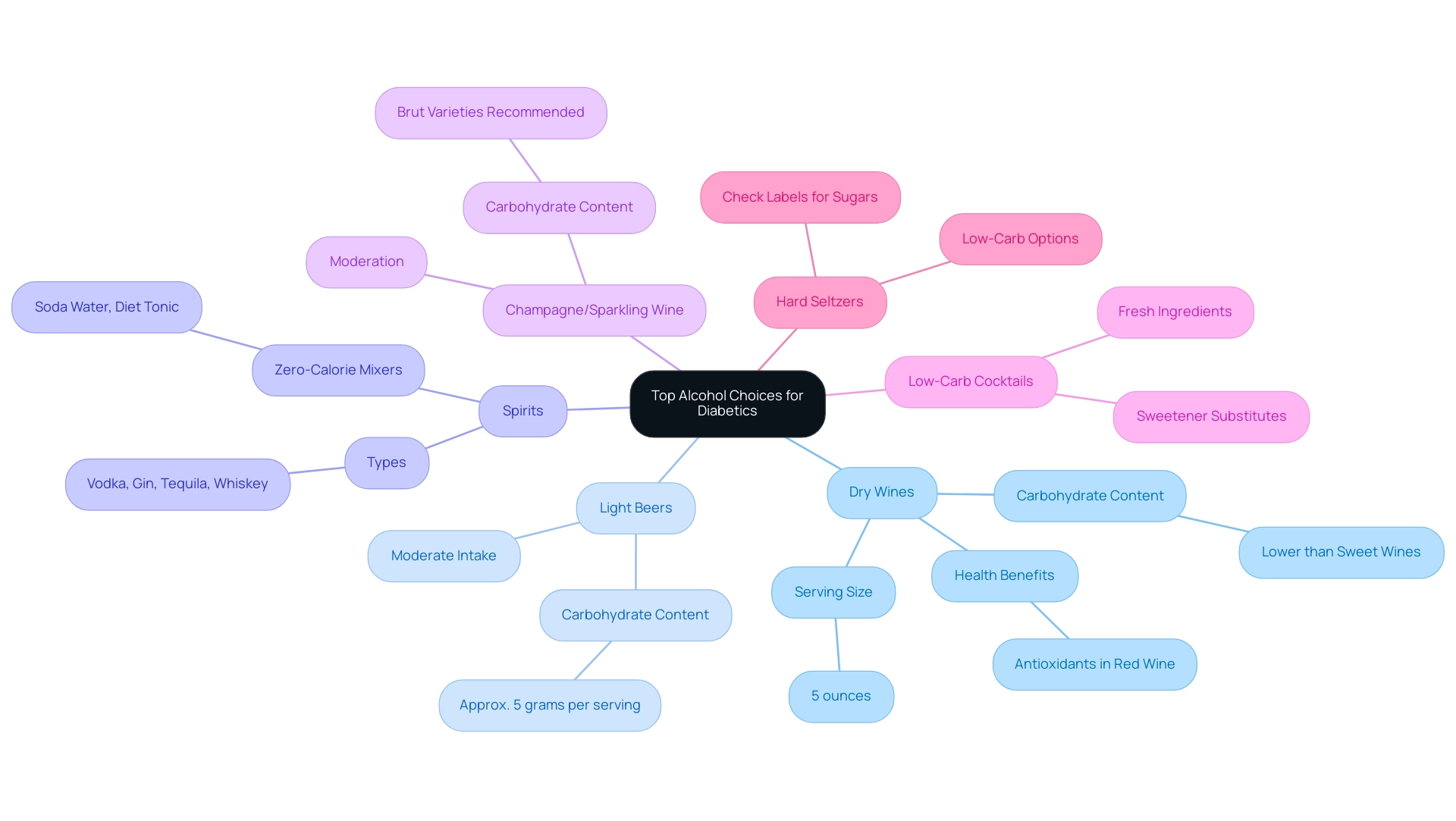
Understanding the Risks of Alcohol Consumption for Diabetics
-
Glucose Variations: Alcohol intake can initially cause a rise in glucose levels; however, it frequently leads to considerable decreases afterward. Research indicates that alcohol diabetics can have, but they may experience delayed glucose recovery from hypoglycemia, which underscores the importance of vigilant monitoring of blood sugar levels before, during, and after drinking. This delayed recovery can increase the risk of severe hypoglycemia, making it vital for individuals to be proactive in their monitoring efforts.
-
Interactions with Medications: Alcohol can interact with blood sugar medications, potentially enhancing or diminishing their effects. It is crucial for individuals managing their condition to consult with a healthcare provider to understand safe consumption levels and the implications for their specific treatment regimen.
Increased Risk of Hypoglycemia: The risk of hypoglycemia (low blood sugar) escalates with alcohol consumption, particularly when consumed on an empty stomach. Diabetics are advised to ensure they eat something prior to drinking alcohol diabetics can have to mitigate this risk. Moreover, hypoglycemic unawareness may occur, further endangering those who consume alcohol.
- Caloric Intake: Alcoholic drinks add excessive calories to the diet, which can negatively influence weight control—a vital aspect of managing the condition. Being mindful of caloric intake is vital for overall health and effective management of blood sugar levels, particularly when considering the alcohol diabetics can have.
Dehydration: Alcohol acts as a diuretic, leading to dehydration that complicates diabetes management. Remaining sufficiently hydrated is essential, particularly when drinking alcoholic drinks, to assist in sustaining optimal glucose levels, which is important for alcohol diabetics can have and for general well-being.
Impact on Decision Making: Alcohol consumption can impair judgment, resulting in poor dietary choices or neglecting essential blood sugar monitoring. Such lapses can have serious repercussions for managing blood sugar levels, underscoring the importance of self-awareness while drinking.
Long-term Health Effects: Chronic beverage consumption poses long-term risks, including liver disease and cardiovascular complications, both of which are already heightened in individuals with elevated blood sugar levels. A study highlighted by McCulloch et al. revealed that heavy drinkers among diabetic men were significantly more prone to developing impotence over a five-year period, indicating broader health implications of beverage consumption in this population. Furthermore, the combination of high blood sugar and alcoholic beverages has been associated with peripheral neuropathy, which worsens nerve damage and heightens the risk of infections and other complications.
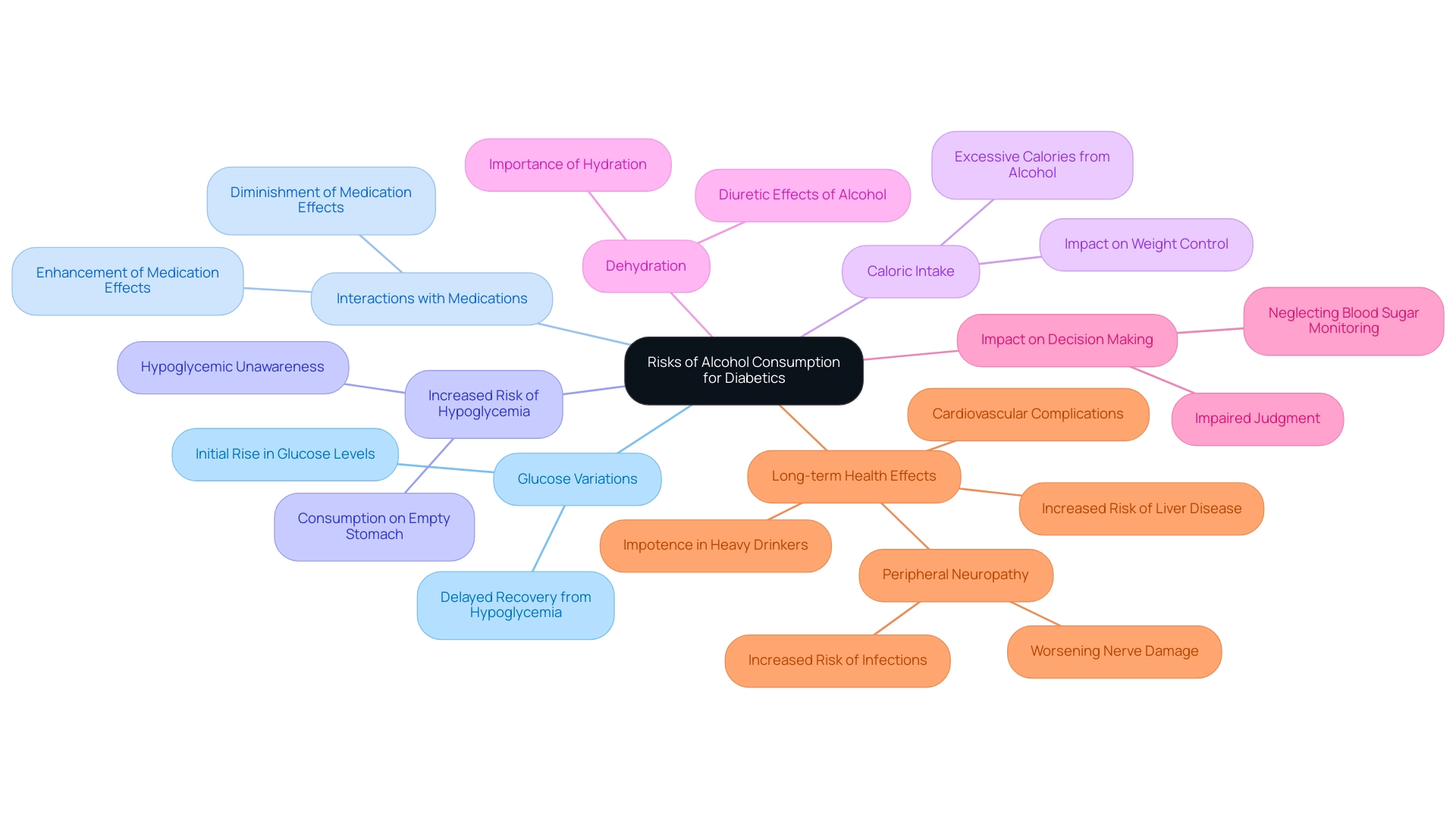
Moderation: The Key to Safe Alcohol Consumption
-
Define Moderation: For individuals managing diabetes, moderation in beverage consumption is generally defined as up to one drink per day for women and up to two drinks per day for men. Significantly, a 40-oz malt liquor contains 5 servings of spirits, highlighting the importance of understanding serving sizes to stay within these limits. Recent studies have raised questions about the previously noted health benefits of moderate drinking, underscoring the need for cautious consumption among diabetics.
-
Plan Ahead: It is essential for diabetics to strategically organize meals and snacks around beverage intake to maintain stable glucose levels. Eating a balanced meal before drinking—rich in fiber and protein—can help reduce risks related to beverage intake. For instance, a carefully organized meal may consist of whole grains, lean proteins, and vegetables, which can reduce the absorption of spirits and allow for the alcohol diabetics can have, thereby lessening glucose spikes.
-
Keep Track: Keeping a record of beverage consumption along with glucose readings is an invaluable tool for diabetics. This practice enables individuals to recognize patterns and comprehend how various kinds of beverages affect their glucose levels. Keeping track of these metrics can inform better choices in the future and aid in discussions with healthcare providers.
-
Set Personal Limits: Each individual with diabetes may exhibit varying tolerances and reactions to alcohol. Therefore, it is essential to set personal boundaries based on individual experiences and glucose responses. This personalized approach can enhance safety and encourage healthier drinking habits that alcohol diabetics can have.
-
Avoid Binge Drinking: Participating in binge drinking presents considerable dangers, including severe variations in glucose levels, which can harm long-term health. The CDC identifies several risk factors for developing type 2, including being overweight and having a family history of the condition. Instruction on the risks of binge drinking is crucial for individuals with insulin dependency, as it can result in severe complications, especially for those using insulin or drugs that influence glucose management. The CDC emphasizes that individuals should assess their overall health status, including whether their diabetes is managed, before consuming beverages.
For additional information on handling diabetes and beverage intake, consider visiting T2DSolutions, your comprehensive resource hub for Type 2 and Type 3 diabetes education and community support. Subscribe to stay updated on new content and resources!
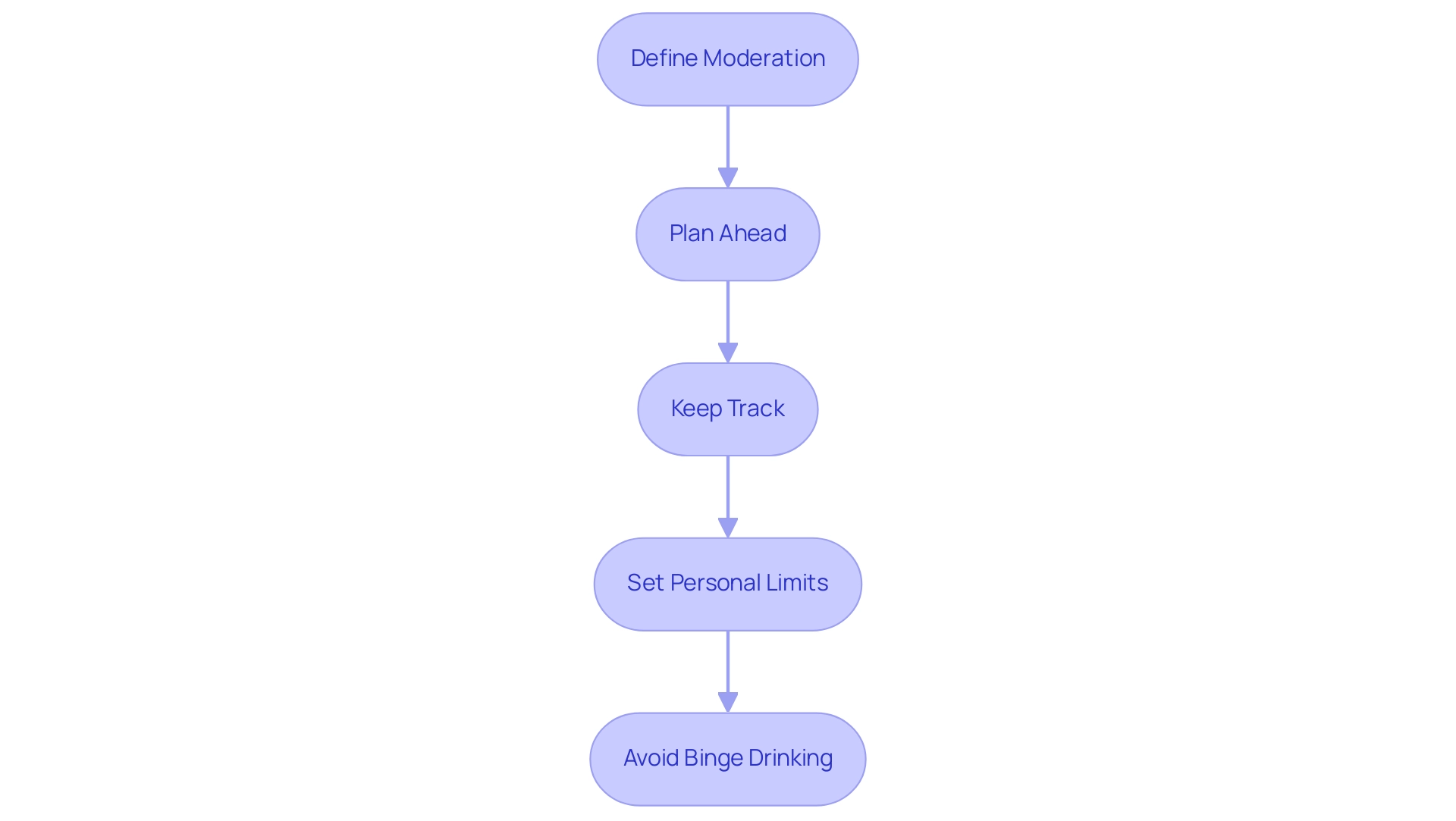
Choosing the Right Time to Drink
-
Avoid Drinking on an Empty Stomach: Consuming alcohol without food can lead to quick decreases in glucose levels. It is vital to consume a balanced meal beforehand, as this can stabilize blood sugar and mitigate the risk of hypoglycemia. Studies indicate that the average insulin dose for individuals managing type 1 diabetes is approximately 10.3 units, with a range of 6 to 17 units. Being aware of these insulin needs can further emphasize the importance of meal timing.
-
Consider Exercise Timing: For those planning to engage in physical activity, it is advisable to consume beverages only after exercising. Physical activity generally reduces glucose levels, which can be exacerbated by spirits, heightening the risk of hypoglycemia. As noted by experts, "Timing may also be an issue, as hypoglycemia can strike hours after your last drink, especially if you’ve been exercising." Observing glucose levels right after exercise is essential to avert unexpected declines, especially since hypoglycemia may happen hours later, particularly if alcohol has been ingested.
-
Be Mindful of Social Events: Social gatherings can present challenges for diabetes management. It is crucial to schedule when to consume liquids and the quantity, coordinating these choices with meal times and glucose monitoring protocols. Creating a drinking plan can assist in managing control over glucose levels in social situations while considering the alcohol diabetics can have.
-
Post-Meal Drinking: Consuming spirits after a meal can help mitigate blood sugar spikes, as food slows the absorption of these beverages into the bloodstream. A study titled 'Impact of Beverage Consumption on Blood Glucose Levels in Type 1 Diabetes' found that moderate beverage consumption led to an increased likelihood of hypoglycemia after breakfast due to reduced growth hormone secretion overnight. This post-meal drinking can be a safer approach for managing diabetes with alcohol diabetics can have. This research emphasizes the necessity for careful observation of glucose levels following beverage consumption.
-
Monitor Blood Sugar Levels: Regularly checking blood sugar levels before and after drinking is imperative. Comprehending how your body responds to beverages can result in improved regulation and handling of blood sugar levels. This practice allows for timely adjustments in insulin doses if needed, ensuring a proactive approach to managing the condition. Blood samples were collected for glucose analysis every 30 minutes during specific periods to understand the physiological effects of alcohol consumption.
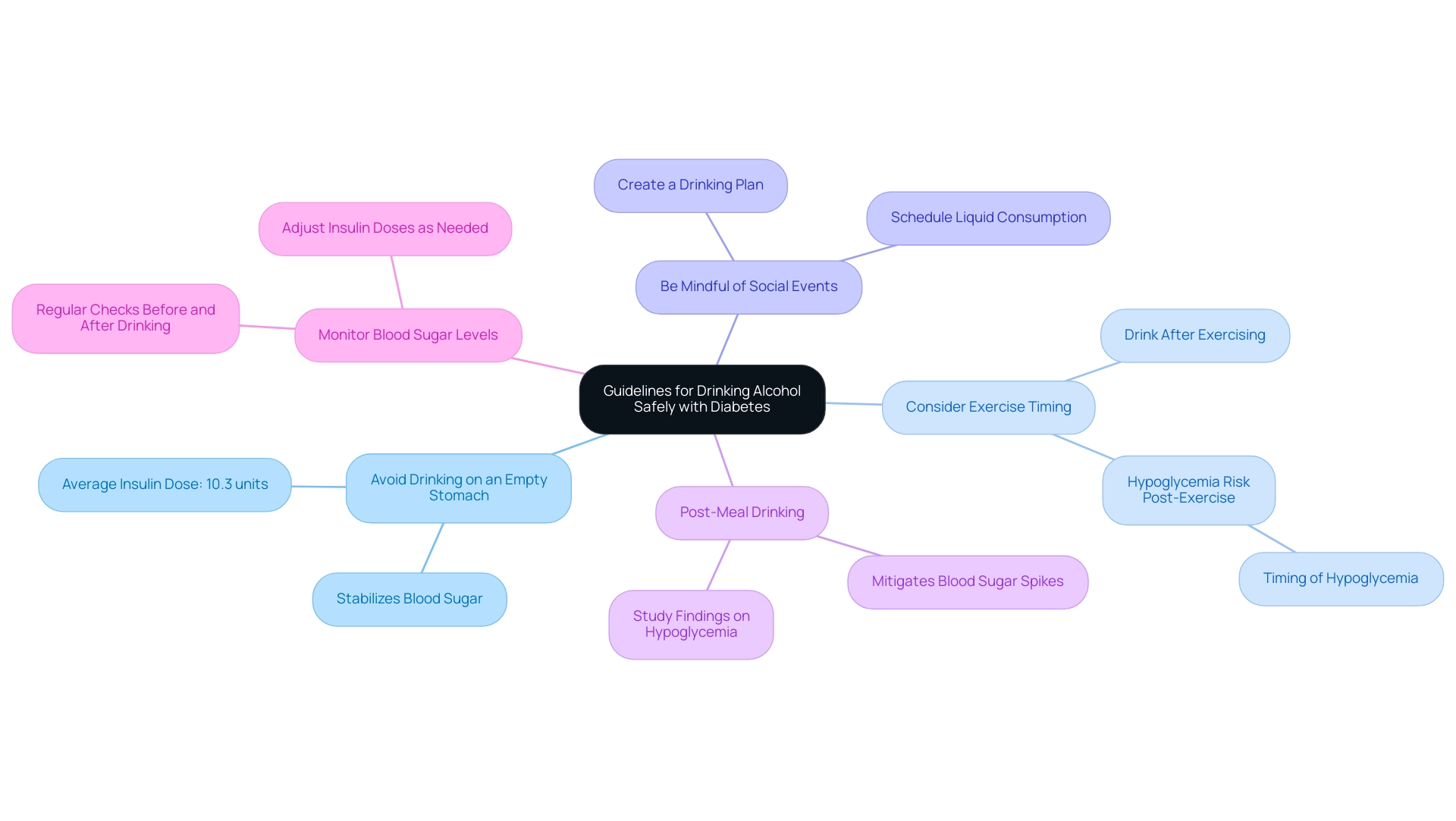
Hydration: The Unsung Hero
-
Importance of Hydration: Maintaining proper hydration is essential for overall health, particularly for individuals overseeing blood sugar levels. It is important for diabetics to be aware of the alcohol diabetics can have, as alcohol consumption can lead to dehydration and requires adequate water intake. As noted by an expert,
Water can lower blood sugar levels slightly. Properly working kidneys naturally filter out some of the extra glucose, and being hydrated helps the kidneys work at their best.
This underscores the critical role hydration plays in diabetes management. Furthermore, a randomized clinical trial demonstrated that replacing sugar-sweetened beverages (SSBs) with plain water led to a significant reduction in fasting glucose levels at 6 months, highlighting the importance of beverage choices. -
Water as a Mixer: Choosing water or low-calorie mixers, such as soda water, when consuming alcohol can significantly reduce caloric intake while promoting hydration. This approach not only aids in managing blood sugar levels but also supports overall dietary goals. Significantly, replacing coffee or milk with SSBs or fruit juices has been linked to a greater decrease in Type 2 Diabetes (T2D) risk, highlighting the influence of beverage selections in preventing this condition.
Hydration Guidelines: Diabetics should strive for a minimum of 8 cups of water daily, with adjustments made based on individual activity levels and climatic conditions. This guideline is particularly crucial when beverages containing ethanol, which are types of alcohol diabetics can have, are consumed, as the dehydrating effects of these drinks can exacerbate underlying health issues. The research employing a 4-year lagged analysis to reduce reverse causation indicates that increased water consumption may be an essential factor in managing blood sugar levels.
Signs of Dehydration: It is important to recognize the signs of dehydration, which may include dry mouth, dizziness, or fatigue. Being attuned to these symptoms can help individuals take prompt action by increasing their fluid intake, thereby maintaining optimal hydration.
- Hydration Before and After Drinking: Consuming water both before and after drinking alcohol diabetics can have is an effective strategy to mitigate the dehydrating effects of alcohol. This practice not only helps alleviate dehydration but also supports overall blood sugar management, ensuring that hydration remains a priority for those managing diabetes.
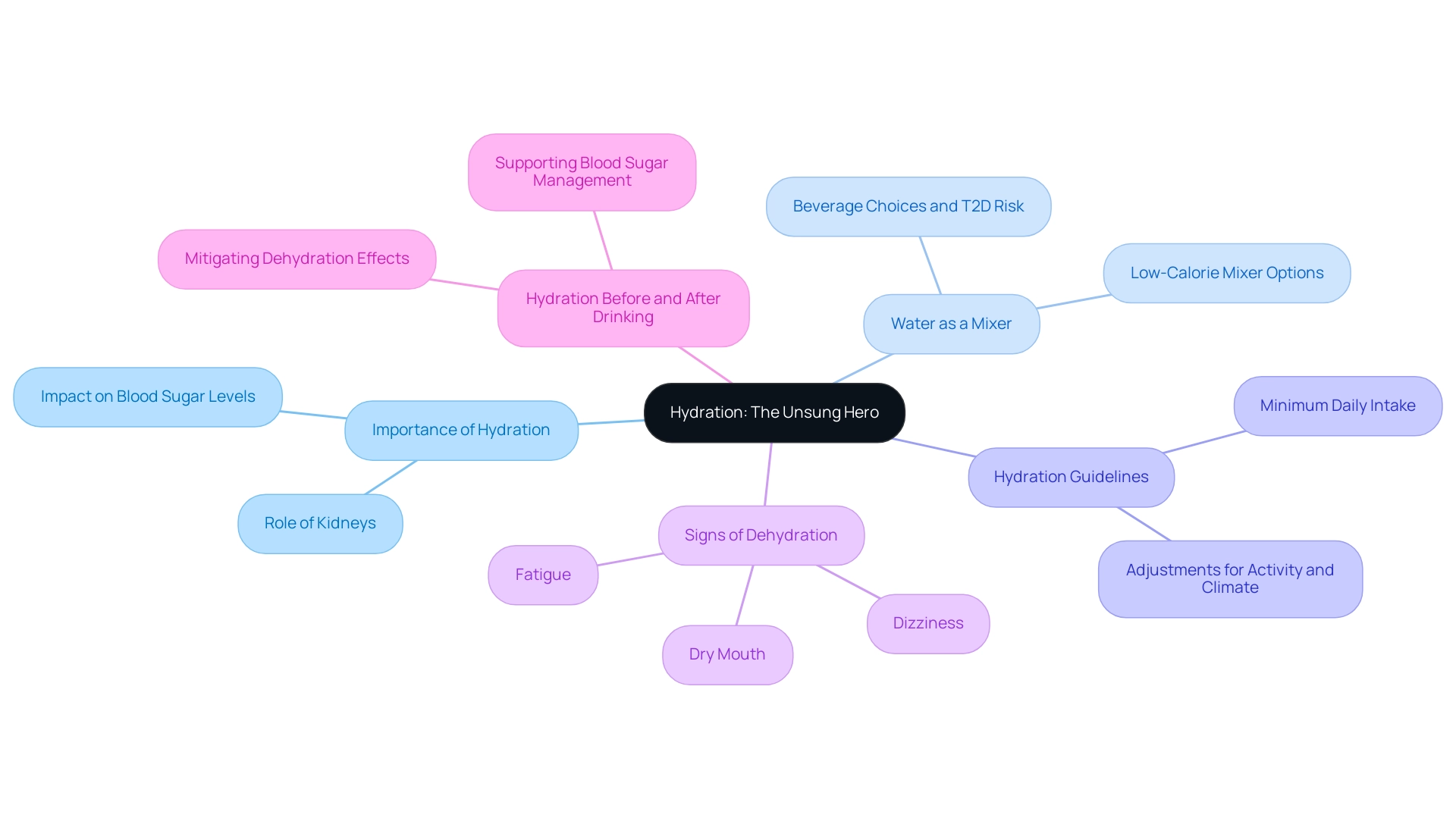
Conclusion
Understanding alcohol consumption in the context of diabetes is essential for maintaining optimal health. This article outlines various alcohol choices that can be suitable for individuals managing diabetes, emphasizing options such as:
- Dry wines
- Light beers
- Spirits mixed with zero-calorie alternatives
Each of these choices allows for enjoyment while being mindful of sugar and carbohydrate content, which is crucial for blood sugar management.
The risks associated with alcohol consumption, including:
- Blood sugar fluctuations
- Potential interactions with medications
- Heightened risk of hypoglycemia
cannot be overlooked. Individuals with diabetes must approach drinking with caution, ensuring they monitor their blood sugar levels closely and consume food alongside alcohol to mitigate these risks. Furthermore, the importance of hydration and planning ahead is highlighted, as these strategies can significantly influence the effects of alcohol on blood sugar levels.
Ultimately, moderation is the key to safely enjoying alcohol for those managing diabetes. By defining personal limits, tracking intake, and making informed choices, individuals can navigate social situations and enjoy beverages while minimizing health risks. Prioritizing these practices ensures that alcohol consumption does not compromise diabetes management, reinforcing the message that informed decisions lead to better health outcomes.



